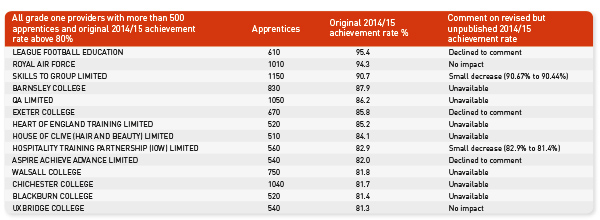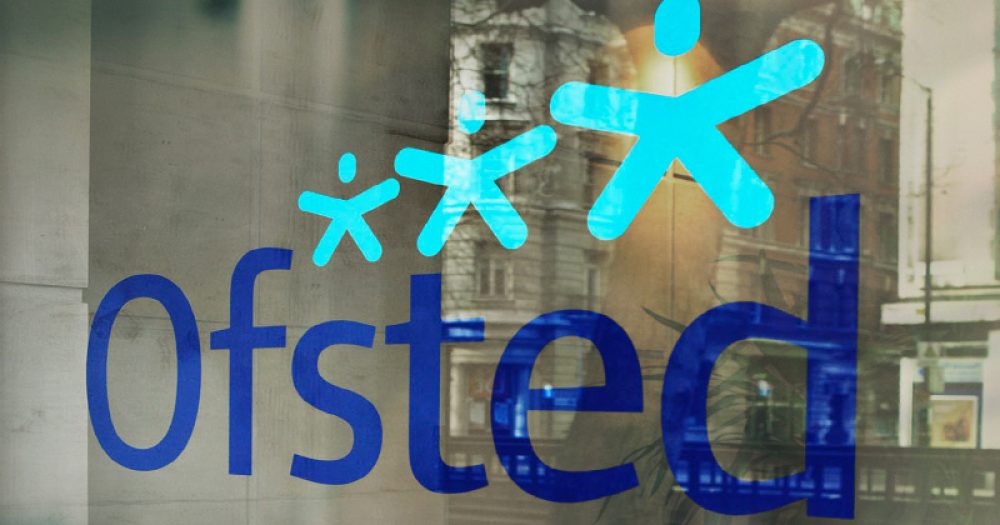Ofsted could re-inspect providers for questionable achievement rates that have come to light following a recent Skills Funding Agency crackdown.
Last week the Department for Education admitted to a loophole in the SFA’s qualification achievement rates calculation, which it said “artificially” boosted the scores for around a tenth of all providers, with some benefiting by more than 20 percentage points.
In the updated January Statistical First Release published on February 16, the DfE outlined three loopholes it has now closed.
One of these was described as an “inappropriate use of the planned break exclusion rule”, which allowed providers to report most learner withdrawals as planned breaks, and therefore gave those that exploited it “a significantly higher QAR”.
As a result, the SFA has recalculated all QAR data from 2014/15 onwards; before this date, QARs were calculated using different methodologies for each of the different strands of FE provision.
Mark Dawe, chief executive of the AELP, tackled the developments in a newsletter to members this week, telling them that Ofsted had confirmed that “where providers have been recently inspected and data makes inspection judgments questionable, they won’t be re-inspecting”.
But FE Week checked this with Ofsted, and received a contradictory answer.
A spokesperson said the watchdog was “aware of issues about the latest QAR data” and would take this into account during FE inspections, but “for those providers whom we have recently inspected, we will consider each case on its merits”.
FE Week approached 14 large providers, each of which has over 500 apprentices, an ‘outstanding’ rating from Ofsted, and QAR data for 2014/15 of over 80  per cent, to ask their views on the changes and how their rates had been affected.
per cent, to ask their views on the changes and how their rates had been affected.
Despite repeated enquires, three of these 14 said they did not wish to comment and seven were unable to respond by the time of going to print.
Rachel Randall, chief executive and managing director of HTP Apprenticeship College said: “We are looking at our own data, but ours hasn’t dropped significantly.
“We may have had a few that have been over-stayers, but other than that we are not going to challenge it.”
A spokesperson for Skills Group Limited, meanwhile admitted that the new methodology had caused a minor fall in its data for 2014/15, while data for 2015/16 remained unchanged.
“In our case, the 2014/15 reduction is the result of breaks in learning for three learners out of 1,150. All three re-engaged in 2015/16, with two of them going on to achieve. It would appear that we’ve been penalised unfairly for two of the three learners,” she said.
“While this does point to unfair treatment of positive outcomes after re-engagement, we will not be disputing with the SFA. We will, however, be changing how we deal with breaks in learning going forward.”
A spokesperson for Uxbridge College said: “The changes have had no effect on the college’s QAR.
“The College is pleased to find that the SFA has now updated the methodology.”
An RAF spokesperson said the changes would not affect its QAR.
According to last week’s DfE report, the SFA’s analysis found that approximately 10 per cent of apprenticeship providers had received “an artificially high QAR rate for apprenticeships” due to “three loopholes in the methodology”. Some gained “a significant advantage of more than 20 per cent in their overall QAR”, while other providers “were able to avoid falling below the minimum standard threshold which was 55 per cent at the time”.








I think for the sake of transparency the SFA should publish the list of providers that benefitted from the loophole and the volumes of learner records affected. Let the public decide whether it’s systematic exploitation of loopholes.
As a side issue, there are massive gaps between the providers operating around minimum levels (55% at the time) and the top performers (excluding football league ‘obsessives!’ and Air force ‘captive learners!’ as out-liers).
The swift expansion of apprenticeships is already causing concerns over quality, we don’t need the unpleasant aroma of ‘gaming’ wafting around the sector and undermining the good work that goes on.
Just think of the IAG situation this creates “we’d like you to enrol onto this apprenticeship framework but you only have about a 60% chance of achieving with us. However, if you enrol down the road at the other provider, they have an achievement rate of 75%, but you should be aware that there’s a chance they may have diddled their figures by more than 20% – It’s your gamble, erm I mean choice”.
FE week, never mind the grade 1 providers, it’s those who sneaked a grade 3 on inflated achievements who need to be revisited. If a provider slips from a grade 1 to a grade 2 – meh, so what? But if they were to slip from a grade 3 to a grade 4 owing to revised achievements – well that is more significant.
Blackburn College supports the revision of the QAR methodology. This has resulted in a minimal decrease of 2% in our Apprentice achievement rates from 81.4% in 2014/15 to 79.4% using the new methodology. This represents 10 learners in total from the cohort of 520.